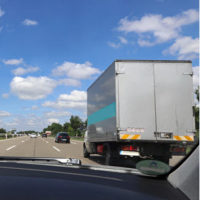Legal Responsibility In Minnesota Truck Crash Cases

A fully loaded large truck weighs at least 80,000 pounds. It’s very difficult even for experienced drivers to control these vehicles, especially in adverse conditions. So, these massive vehicles frequently cause collisions and frequently cause serious injuries.
Damages in a Minnesota truck crash case usually include compensation for both economic losses, such as medical bills, and noneconomic losses, such as pain and suffering. Additional punitive damages may be available as well, in some cases.
First Party Liability in Minnesota Truck Crashes
Truck drivers are common carriers in Minnesota. Because they are professional drivers who haul people and/or goods for a fee, they are held to a higher standard of care.
Intersections are a good example. A noncommercial driver is usually free to proceed through the intersection once the light turns green. But a commercial driver arguably has a responsibility to pause, survey the intersection to ensure that it’s clear, and then proceed.
Minnesota truck drivers may have a higher duty of care, but they exhibit some of the same bad driving behaviors that noncommercial drivers display. Human error causes over 90 percent of car crashes. Typically, that error comes in the form of:
- Speed: At 65mph, a fully-loaded large truck travels the length of two football fields between the moment the driver applies the brakes and the moment the vehicle safely stops.
- Alcohol: Since impairment begins at one drink, most states have a lower BAC threshold for commercial drivers than noncommercial drivers. Nevertheless, alcohol intoxication is still a factor in about a third of the fatal truck crashes in Minneapolis.
- Fatigue: Most shipping companies pay their drivers by the load and not by the mile. So, the drivers often cut corners on rest breaks to deliver cargo on time. Driving after just eighteen sleepless hours is like driving with a .08 BAC.
The federal government keeps tabs on these areas, and others, through the Safety Management System. The SMS makes it easier to prove that a truck driver may have been negligent in a Minneapolis car crash.
Third Party Liability in Minnesota Truck Crashes
In catastrophic injury cases, the individual tortfeasor (negligent driver) may not have enough insurance coverage to fully compensate the victim/plaintiff. Fortunately, respondeat superior (“let the master answer”) normally applies in these cases. There are two basic prongs:
- Employee: Independent contractors, owner-operators, and almost anyone else that the employer controls are usually employees for negligence purposes. Most Minnesota courts use the broad Department of Labor standard, which is “suffer or permit to work,” to determine who is an employee.
- Scope of Employment: Any act that benefits the employer in any way usually falls within the course of employment. That could be something like driving an empty truck which bears the company’s logo. In that case, the employer benefits from the free advertising.
In the unlikely event that respondeat superior is inapplicable, there are other employer liability theories available. Negligent hiring and negligent supervision are just two examples.
Reach Out to a Compassionate Attorney
Truck crashes usually involve complex legal theories. For a free consultation with an experienced personal injury lawyer in Minnesota, contact the Gunther Law Office. Home and hospital visits are available.







